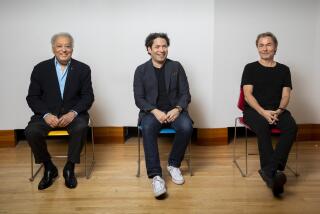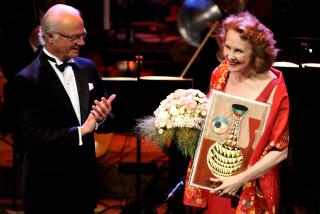Ralph Shapey, 81; Known for His Atonal Compositions
- Share via
Ralph Shapey, a classical composer and conductor known for his Abstract-Expressionist style that pushed the limits of the musical establishment, died June 13 in a Chicago hospital of complications from heart and kidney disease. He was 81.
The author of more than 200 compositions, from solo pieces to orchestral works, Shapey liked to describe himself as a “radical traditionalist.”
Born in Philadelphia, Shapey was a violin prodigy who began playing at the age of 7. As a teenager he studied the violin with Emmanuel Zetlin.
After serving in the Army during World War II, Shapey moved to New York City, where he studied composition with Stefan Wolpe and worked as a free-lance violinist.
In 1954 he founded the Contemporary Chamber Players of the University of Chicago, which under his direction became an influential new-music performing group.
Although over the years his music was applauded by critics, and Shapey conducted symphony orchestras in Buffalo, Chicago, New York and Philadelphia, the atonality of his work made it somewhat inaccessible to most classical audiences and orchestras .
But Shapey was undeterred by the response, saying, “I have said to my audiences, ‘Bring your brains and humanity to the concert. Leave your prejudices at home.’ ”
Shapey made his living in the world of academia. He taught briefly at the University of Pennsylvania before moving to the University of Chicago. He taught composition there until 1985, when he joined the faculty at Queens College of the City University of New York.
Over the years Shapey was awarded a number of prizes, including a MacArthur “genius” grant, a fellowship at the Institute of Arts and Letters and a creative arts award from Brandeis University.
He also created works on commission from the National Endowment for the Arts. He was a member of the American Academy and Institute of Arts and Letters.
His brush with celebrity came in 1992 when the Pulitzer Prize board overruled the unanimous recommendation of its music jury, and decided not to award that year’s music prize to Shapey’s “Concerto Fantastique.” At the time, the Pulitzer board president said the board wanted to present “a consumer’s point of view.” Shapey responded: “If that is what they want, why don’t they start shopping for their music at Kmart.”
He is survived by his son, Max; two stepchildren and two grandchildren.
More to Read
The biggest entertainment stories
Get our big stories about Hollywood, film, television, music, arts, culture and more right in your inbox as soon as they publish.
You may occasionally receive promotional content from the Los Angeles Times.










